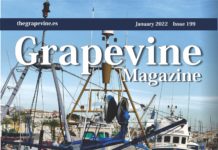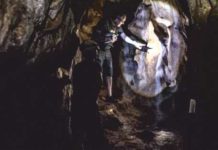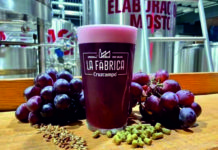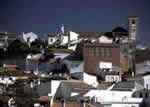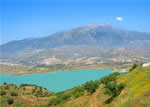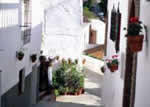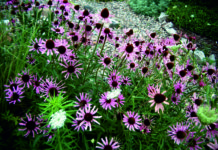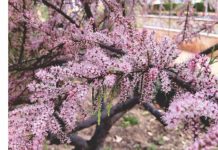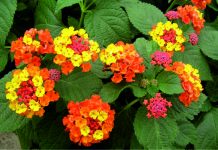I hope you all opened your doors on the last stroke of midnight to see out the old year and welcome in the new. I may not be the first person to cross your doorway in 2019 – nor am I tall, dark and handsome – and I won´t be carrying coal, bread, or money, but greenery, yes! But my wish and resolution would be to make a difference to our lives in 2019 and I know that many of you are willing, ready and already making that change.
Let's resolve to help Mother Nature become natural, magical and beautiful again; she only needs our help; she knows how to heal if we will only allow her.
Some might say the entire climatic catastrophe is scare-mongering nonsense. But it's hard to ignore the ever-increasing deluge of signs – droughts, torrential flooding, hurricanes, wild fires – it's daily and getting closer to all of us. Just look on the internet and you'll see all kinds of scary statistics. The world's 7.6 billion people represent just 0.01% of life on our planet yet, since the dawn of 'civilisation' we have wiped out 83% of wild mammals and half of all plant life; of all the mammals on Earth, 96% are livestock and humans, only 4% are wild mammals. Chicken bones are now ubiquitous across the planet; farmed poultry and domesticated birds make up 70% of birds on Earth today. We've reached the stage where of all the mammals on Earth, humans and livestock make up 96%, only 4% are wild creatures. Marine mammals suffer the same; their numbers are reckoned to be down by 80% in the last 300 years, largely as a result of whaling.
We may think we are great and mighty but there are three times more viruses than humans; three times more worms (though you may say you never see one!); in spite of all our decimating efforts there are still 3 times more fish: 17 times more insects, spiders and crustaceans; 200 times more fungi; 1200 times more bacteria and 7500 times more plants. And plants still account for 82% of biomass on our planet. These statistics may seem, initially, encouraging but it just goes to show how teeming with life our planet once was. Nowadays, 200 species are being lost every day. This is the level of our destruction.
We have a hugely disproportionate impact; it is our duty and responsibility to put things right. There is a tremendous gap between what needs to be done and what is being done. We all know the three R's – reduce, re-use, recycle but there's a new R on the block – rewilding.
I like all the R words but I do find rewilding intensely exciting. It basically means letting Nature take care of itself, allowing her natural rhythms to create wilder and biodiverse habitats – with some help, instead of destruction, from us. It involves the reintroduction of key species of animals, often apex predators. You might say it's like returning to the 'good old days' but with modern twists. Is it feasible? You might well ask.
The problem with lots of current-day conservation is that it is costly. Planting 50 million trees to help with CO2 levels is expensive, even when carried out by volunteers, and how many of the saplings will survive? And, worse, we are creating, in many cases, another mono-culture. If Nature were allowed a free hand, it would be far cheaper, more natural with greater bio-diversity and more effective. In those 'good old days' there was scrubland, often thorny, composed of plants like hawthorn, bramble, dog-rose and gorse. This provided a great buffer against predatory grazing animals, wind, drought, flooding and it helped the mycorrhizal world underground connect and develop. At the same time it provided great habitat for insects, birds and small animals who would pollinate and spread seeds around. And, coincidentally, provided us with materials for tools, furniture, thatching, firewood and charcoal, dyes and medicines. I was gobsmacked to read recently that a single jay can plant 7,500 acorns in just four weeks – and for free! They carry up to six acorns in their gullets at a time, flying, often, to protective scrub and store them there for feeding during the winter. Like the squirrel, many of these seeds are forgotten and develop into saplings nurtured by the thorny scrub. It's been said that once a squirrel could have ran through the tops of trees from John O'Groats to Lands End! I doubt the truth of it, because clearings and sunlight are part of the essential process; without sunlight there's little throb of insects, birdsong or wild flowers but it's a nice (bushy) tale! One thing is for sure, this type of planting ensures diversity, healthy trees and natural regeneration.
So how can we help? Invite life back into our gardens! One of the great parts of living here is that we don't, generally, have pocket-handkerchief sized gardens – we have land. Land to give back to Mother Nature – leave it alone and let it rewild. Retain your garden patch around the house but use more natural plantings – species that are native, perhaps, or, at least, adapted to our climate. But the wilder parts of your garden could be just that – let the wildflowers have their day, the 'weeds' provide for a myriad of creatures, the scrub give succour to our trees. Those of you who delight in strolling around Viveros Florena will recognise that we have long upheld this practise. We have no unfriendly aluminium and glass. Our garden areas are not immaculate; we do have scrubland, we have hedges, trees, overgrown corners and even weeds! Our recycling watering system provides shady, damp corners for frogs and toads. Birds nest in our trees, even though they're for sale! We'll reserve them and you can collect once the fledglings have flown – believe me, we've done that. We've spiders, snakes, robins and chameleons and we love them all- well, in truth, my daughters aren´t too keen on spiders and grasshoppers but it's a work in progress!
Heal the Earth – every little square forms part of a big patchwork blanket that our Governments and Big Businesses cannot touch. As landowners and gardeners we owe it back to Mama Nature.
(Figures taken from The Guardian newspaper)
The Viveros Florena Team wish you all a very green 2019.
We re-open on 2nd January 2019 when our weekly Florena Food and Health Market will be in full swing – naturally!
The Viveros Florena Team,
Cómpeta, Málaga, 29.754
Lorraine Cavanagh: Author of Mediterranean Garden Plants and Citrus, the Zest of Life.
Garden Centre, Landscape Designers and Constructors.
Winter Hours: 10-4 closed Sundays and Mondays.
Bio Food and Health Market every Wednesday morning
Tel: 689928201
Email: florenaspain@hotmail.com
Web: www.viverosflorena.com
Facebk: Lorraine Cavanagh's Garden Centre



